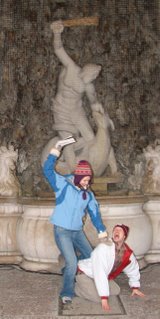Edward J. Larson was the guest for my department’s colloquium yesterday. It was neat to get a chance to talk with him during the graduate student coffee beforehand, where I was the host (even if it was hard to get a word in edgewise). Larson is an interesting character for a number of reasons. His research interests are admirably sprawling; he’s a legal scholar as well of as a historian of science, and religion, and politics, and law. He was Frank Herbert‘s lawyer; as he told it, it was his job to call up Frank and tell him when he’d been at his foreign residence too long and had to get back home to avoid extra taxes. He studied history at Wisconsin under Ron Numbers, and he shares an inordinate number of interests with my advisor Dan Kevles (including eugenics, law, the Galapagos, Antarctica).
Like Numbers (and unlike the vast majority of scientists and philosophers), Larson takes an extremely balanced approach to his work on creationism and its permutations (see his two books, Trial and Error and Summer for the Gods). And in lot of ways, he’s in a perfect position to do something powerful and significant for the public discourse over Intelligent Design. He has a track record with his Pulitzer Prize-winning Scopes Trial book, which is well regarded by creationists, anti-creationists, and historians of science (no mean feat). By odd coincidence, Larson was a fellow of the Discovery Institute, doing unpaid consulting on their Cascadia Project (which is funded mostly by the Gates Foundation, even now). He left when they got into ID, but obviously his connection there just adds to his credibility on the topic. Larson was at University of Georgia for a number of years, but recently moved to Pepperdine University, where he still does both law and history. Pepperdine is a Church of Christ school (coincidently, the non-denomination both Matt Gunterman and I grew up in); Larson was raised a Lutheran (I think of the ALC variety, now part of the ELCA ), though I’m not sure how religious he is now.
Anyhow, the point of all this is that a book on ID by Larson would demand respect from a lot of corners. When I asked him why he hadn’t done more with it (his latest projects are on the election of 1800 and Antarctic exploration), he got defensive. On the one hand, he insisted he had in fact written a lot on ID (articles in an assortment of popular venues; the updated version of Trial and Error; public lectures like the one he’s giving this afternoon; his appearance last year on The Daily Show). On the other hand, he explained, Intelligent Design is extremely hard to pin down. Each of the main figures at the Discovery Institute has a different take on what exactly ID entails, and each is defending a different set of metaphysical doctrines (obviously, even if not explicitly). To further complicate things, there’s the tricky relationship between “Intelligent Design” and “intelligent design”, the utterly blurred continuum from Phillip Johnson to William Dembski to Michael Behe to Mike Gene to Francis Collins to Ken Miller. So Larson said that Intelligent Design isn’t a discrete historical topic, and that this kind of thing (cultural/intellectual history?) is not what he does. (He has written a general history of evolution, a concept at least as historically amorphic and flexible as ID, but I digress.) His understanding of the complexity of the issue (as opposed to the polemics that currently pass as scholarly analysis, which tend to have a monolithic view of ID) is exactly why he should write the book on it. I guess the real issue is that he doesn’t think ID is a significant issue in the long term, which I think is (for better or worse) may not be the case.
On a related note, Horganism has a pair of posts (part 1, part 2) about an interview with Francis Collins that are worth looking at.



